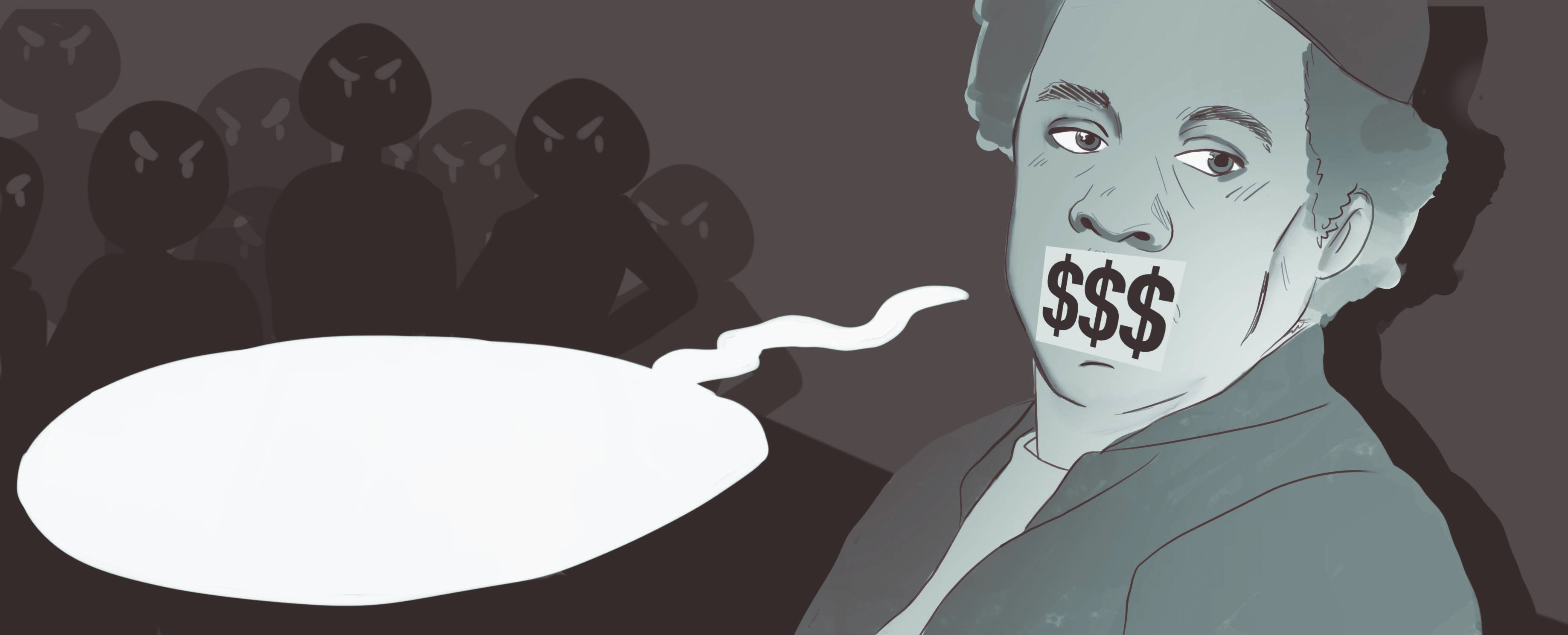Why we shouldn’t idolize Jay-Z or his hypocrisy
Hip-hop mogul and businessman Jay-Z recently joined his musical counterpart Kanye West in throwing the black community under the bus to get ahead. After years of boycotting the NFL in defense of free agent Colin Kaepernick and getting other celebrities to join in, Jay-Z announced plans to work with the organization as part of a “social change” initiative. His actions so far as a musical ambassador have included blaming victims of police brutality and remaining complacent as an NFL-sponsored charity promotes self-hate and internalized racism. Despite initially being given the benefit of the doubt, the rapper has proven himself to be a false prophet.
When the partnership was announced on Aug. 13, the black community responded with confusion as sports reporter and former ESPN anchor Jemele Hill sent out a tweet wondering whether Kaepernick knew or was involved. The player was blackballed by the NFL after kneeling during the national anthem in support of victims of police brutality. While Kaepernick’s former teammate Eric Reid and longtime girlfriend Nessa Diab both said the player was upset by Jay-Z’s actions and hadn’t been involved, the rapper claimed that he had spoken to the player prior to announcing the deal. A source Hill spoke to in the aftermath of the announcement said that while the conversation had happened, it “was not a good conversation.” So Kaepernick was not aware, or worse, was aware and advised against it, but Jay-Z still went forward with the partnership. With that, we got our first red flag.
The next warnings that Jay-Z was hurting, not helping, the movement that Kaepernick started came when a video from a January panel the rapper participated in was uncovered. In the clip, Jay-Z claims that black men from fatherless households have problems with authority, which is why encounters with police result in death and violence. Let’s unpack that.
First, it relies on the myth that most black fathers are absent and uninvolved in their childrens’ lives, despite the fact that about 60% of black fathers live with their children. According to a 2013 CDC study, black fathers are actually more involved in their childrens’ lives than their white counterparts. So not only does Jay-Z’s statement rely on a baseless myth, it also places the blame on victims for not “respecting authority.” His statement ignores numerous instances of police violence, such as that of Philando Castile, where victims complied, only to be killed. With that statement, Jay-Z simultaneously spread a harmful stereotype and tried to justify the murder of innocent black men. Sir Carter, Jay-Z’s son, will grow up as a black man in America. When — not if, but when — he encounters police violence, will his father blame him then? Will Sir’s father say that he shouldn’t have had a problem with authority? This statement and Jay-Z’s clear ignorance of its impact became the second red flag.
What prompted me to write this piece, however, was when photos of the founder of Crushers Club, one of Jay-Z and the NFL’s “hand-picked, vetted” charities, surfaced. In the pictures, founder Sally Hazelgrove is seen cutting off a teenager’s dreadlocks so he can stop running with gangs and “have a better life.” After receiving criticism, Hazelgrove apologized and the teen who was in the photos posted a video in defense of the organization, which was retweeted by Roc Nation, an entertainment company owned by Jay-Z. But this speaks to a bigger issue. Why should traditionally black hairstyles be seen as negative? Why should they be seen as something that holds us back? Jay-Z himself is currently wearing dreads, along with other influential black creators such as filmmaker Ava DuVernay. California and New York recently passed laws to combat hair discrimination. Kerion Washington, a Fort Worth teen, was denied a job at Six Flags Over Texas because he had dreads. While this may seem trivial, it speaks to a larger issue of black people being forced to either conform or justify every aspect of their existence. All this incident did was show Jay-Z’s disconnect from the black community. He wants to own an NFL team, and he’s using not only Kaepernick, but the struggles of the black community, as his price of admission.
When I first heard the news about Jay-Z partnering with the NFL, despite Kaepernick not being involved, I cautiously accepted it. I took Jay-Z’s justification of being “past the point of protesting” at face value and looked forward to seeing the change that would come from his involvement, but all this has led to is repeated disappointment. All I’ve seen is a man who is desperate for personal gain and is willing to do anything to get it. We might be past protesting, but with people like Jay-Z holding us back, it’s hard for the movement for black rights to make progress.
Even with his history of supporting black causes such as the movement to free rapper Meek Mill from police persecution, Jay-Z has stooped to the level of being the NFL’s token black person, their get-out-of-jail-free card for racism. But his actions can also be a lesson that by putting people on pedestals or idolizing them, we set ourselves up for disappointment. As the saying goes, “skinfolk ain’t kinfolk.” Not all black people in positions of power will fight for their communities nor will they hesitate to denigrate their own. I can only hope that Jay-Z will stop tap dancing long enough to get himself out of the sunken place.

Leave a Reply